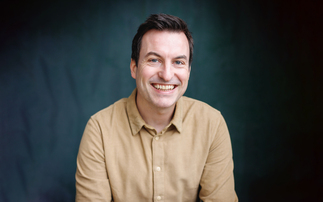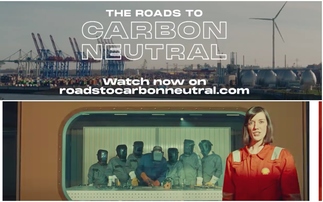Founder of Greenhouse PR reveals how she came to focus her career on climate action and clean tech pioneers
Anna Guyer is the founder and director of Greenhouse PR, a communications agency entirely focused on accelerating the transition to a sustainable and green economy. Previously, Anna was a Board Director at Hill & Knowlton and Trustee of Transition Towns.
Greenhouse PR won BusinessGreen's award for Green PR Agency in both 2015 and 2016.
Where were you in 2007?
I founded Greenhouse in 2007, with a mission to work with pioneers and entrepreneurs to create positive social and environmental change.
This was a personal response to a powerful film made by the Christian NGO Tearfund, which told the story of families across Africa who could no longer live or farm on their land due to the huge impact of climate change. The film brought home the consequences of climate change and the disproportionate impact it has on the world's poorest people. Even then it had already created thousands of environmental refugees.
It was a life-changing moment and I decided that, however daunting the task, the focus of my work needed to be addressing climate change and helping to create a more sustainable future.
In the 10 years since then, Greenhouse has worked with energy pioneers using renewables and battery storage to create a smart, cost-effective, low-carbon power system; transport pioneers launching electric and hydrogen cars and low-carbon alternatives to diesel for HGVs; food pioneers promoting organic food and sustainable agriculture; and financial pioneers educating capital markets and investors about climate risk.
We have used our communications expertise to help organisations have more impact, raising awareness of the solutions they offer and why they are needed. We have enabled them to reach policymakers and investors, customers and consumers, encouraging people to wake up to the potential of the new green economy.
Where do you expect to be in 2027?
By 2027, I hope to be living in a world that has embraced not just the urgent need for a green economy but also its huge potential.
Today's disruptive innovations and the fast-developing sharing economy are transforming the way we live and work, and with the current pace of change, so much is possible.
But we will still be living in an unsustainable world. Ten years from now other challenges such as water shortages, air quality and biodiversity will all be much higher up the agenda.
Greenhouse will still be working with the pioneers - businesses, entrepreneurs and campaigners who find opportunities in developing extraordinary solutions to these problems, whether that is using emerging technology to develop better services, developing a revolutionary new product or finding new and powerful ways to analyse problems.
There will still be just as much need to frame clear powerful messages about why their solutions matter to people, business and the economy, and to offer a compelling vision of a sustainable future.
Even small organisations can have a global impact when a powerful proposition is communicated well - just look at the influence of Carbon Tracker as it has brought the concept of the carbon bubble and stranded assets to policy makers, influencers and investors on a global scale.
We need organisations to be brave, to be focused, and to communicate effectively if we want to scale the change we need to see.
What is the most important lesson you have learned over the past 10 years?
Do what you can where you can. Don't procrastinate - get on and do it.
Surround yourself with others who share your values, who want to support you in your mission.
The new green economy is a sharing, collaborative economy, full of intelligent, passionate and fascinating people. So always learn from those around you and collaborate and support others wherever you can.
What is your vision for the green economy in 10 years' time and what do we need to get us there?
I want us to create a thriving, smart, green economy that will be regenerative and restorative for both people and for the planet.
We need governments and businesses to understand and recognise the value and importance of ecosystem services, and become more accountable for their decisions and our footprint in the world.
We need financial markets to invest in the solutions that exist, shifting billions away from funding unsustainable activities. There is growing awareness of 'climate risk' but not enough recognition of 'climate opportunity'.
And ordinary people need to recognise that their money can have real impact. We can all help shape the future by choosing where we save and where our pension is invested. There are many funds that support renewables, protect resources such as water and forests, address social inequality, and still get a good financial return.
If we all invested just 10 per cent of our savings and pensions in ethical and sustainable funds, then individuals and institutions could be investing billions in the change we need to see.
Will the world be on course for two degrees in 2027?
I think we have the knowledge and technological capability to get there. The growth of renewables is now unstoppable and that, combined with battery storage and electrification of transport, creates huge opportunities for transformation.
But governments and policy frameworks have a huge part to play. They also have the frustrating potential to slow everything down.
If you could invest in one clean technology through to 2027 which would it be and why?
Solar power and battery storage - these are disruptive technologies which are growing exponentially as costs continue to fall. They are fundamental to decarbonising our economy and they offer real benefits to individuals and communities.
Solar panels on household roofs linked to home batteries and electric car batteries have huge potential when they are managed in a virtual power plant. Communities will soon be sharing the power they generate so that everyone saves money, and earning further income by providing services to support the grid.
At a network level, domestic and utility-scale storage will allow clean solar and wind power to provide an increasing proportion of our electricity. By managing these in a smart grid we can reduce the need for fossil fuel power stations and cut the costs of running the system.
We are well on the way to decarbonising power, but our electricity system will also need to support rapid growth of electric vehicles over the next decade and beyond. This will create even more demand for solar and storage.
But I also have to champion the protection of scarce resources - and in particular water and timber. It is possible for us all to invest in the things that we care about. Water is going to be such a critical issue that investing in its protection is critical.
What advice would you give to a sustainability professional starting their job today?
Recognise the power of good communications. Business pioneers, technology entrepreneurs, and social enterprises are doing amazing things, but they need help to take those ideas to scale.
We need more communicators to share stories with networks of influencers and decision makers, mobilise support and accelerate the transition.
Are you optimistic or pessimistic about the future?
I feel lucky to be a natural optimist, and I surround myself with people who help me to sustain that. I am fortunate to work with entrepreneurs and pioneers - people pushing the boundaries of what's possible - who by their very nature, see a problem as a reason or a catalyst to find a solution.
Hope is a powerful motivator. It's too easy to feel powerless when confronted with the challenges we face - that's why we need to give people a positive and encouraging vision of what the future can look like.
We help people to see the potential and to realise that we all have significant role to play in building a better, more rewarding and more sustainable world.







